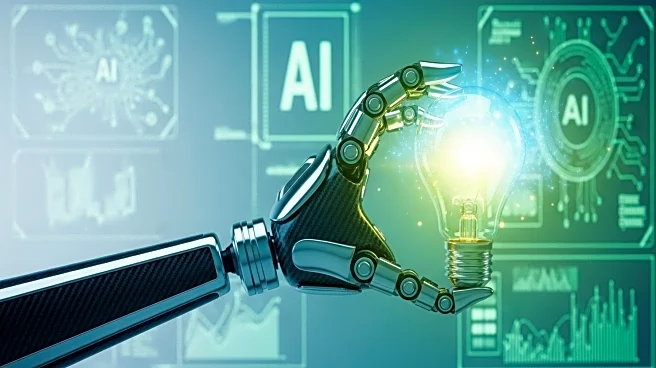What's Happening?
Walmart, the largest private employer in the U.S., is addressing the impact of artificial intelligence on the job market by identifying necessary skills for its workforce. The company hosted over 300 experts and representatives from various companies as part of the Skills-First Workforce Initiative, which aims to develop stable jobs based on skills rather than educational background. Walmart has already launched training programs for truck drivers and maintenance technicians, roles that are in high demand due to retiring tradespeople. The retailer plans to introduce an AI skills program next year in collaboration with OpenAI, the company behind ChatGPT. Walmart CEO Doug McMillon emphasized the importance of adapting to AI, stating that every job will be transformed by new tools, enhancing roles rather than eliminating them.
Why It's Important?
The initiative by Walmart is significant as it addresses the evolving landscape of employment due to AI and demographic shifts. By focusing on skills-based hiring and training, Walmart is preparing its workforce for future challenges, potentially setting a precedent for other companies. This approach could lead to more stable employment opportunities and help mitigate fears of job loss due to AI. The collaboration with OpenAI suggests a proactive stance in integrating AI into the workforce, which could enhance productivity and create new job categories. As AI continues to influence various industries, Walmart's strategy may serve as a model for balancing technological advancement with workforce stability.
What's Next?
Walmart plans to roll out its AI skills program next year, aiming to equip its employees with the necessary tools to thrive in an AI-driven environment. The company will continue to invest in wages and training, ensuring that its workforce remains competitive and adaptable. As the initiative progresses, Walmart may face challenges in recruiting for roles like maintenance technicians and truck drivers, but the focus on skills-based hiring could alleviate these shortages. The success of this program could influence other companies to adopt similar strategies, potentially leading to broader changes in the U.S. job market.
Beyond the Headlines
Walmart's initiative highlights the ethical and cultural dimensions of AI integration in the workforce. By prioritizing skills over formal education, the company is promoting inclusivity and equal opportunity, which could have long-term societal impacts. The shift towards skills-based hiring may challenge traditional views on employment qualifications, encouraging other industries to reconsider their hiring practices. Additionally, the collaboration with OpenAI underscores the importance of transparency and communication in navigating technological changes, fostering trust and cooperation between employers and employees.









